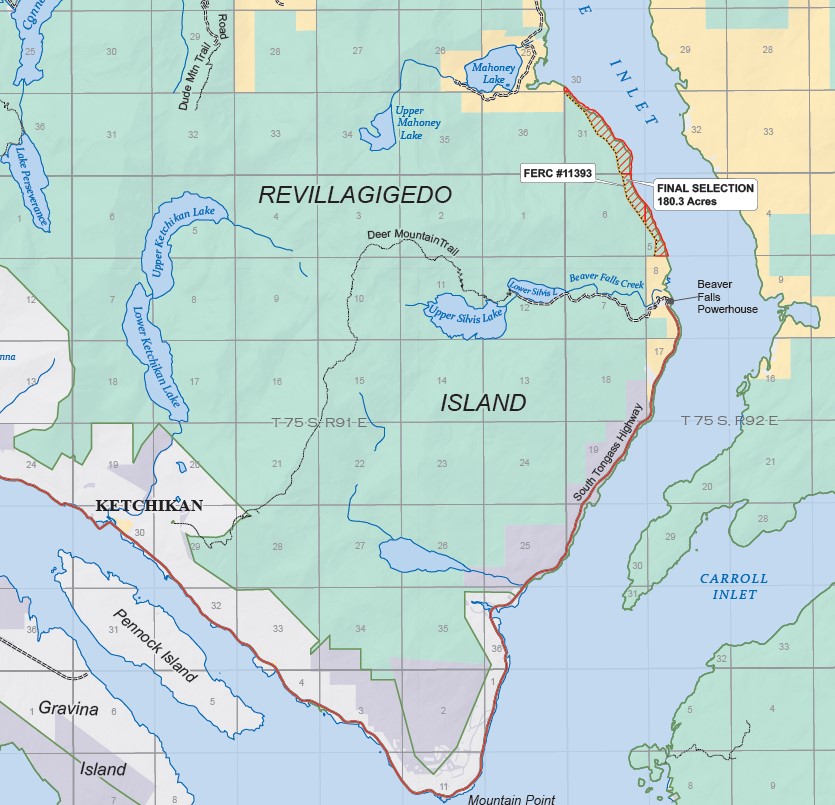
U.S. Senators Lisa Murkowski and Dan Sullivan and Representative Mary Peltola introduced legislation Jan. 19 that seeks to forego a unique restriction in the Alaska Native Claims Settlement Act (ANCSA). The bill aims to settle a decades-old dispute that has prevented the Cape Fox Corporation from claiming all of the land they are entitled to under the act.
Cape Fox Corporation is the Alaska Native village corporation organized under ANCSA for the Native Village of Saxman, near Ketchikan.
It’s one of dozens of Native corporations statewide that were returned 44 million acres of ancestral land from the federal government – with restrictions.
One of those restrictions required the corporations’ land to be at least two miles from any existing city boundaries – except for Cape Fox. That distance for the Cape Fox Corporation was expanded to six miles from the nearest city in order to protect nearby Ketchikan’s watersheds.
Cape Fox Corporation couldn’t be reached for comment. But in a press release, the corporation alleges the six-mile requirement created a unique problem for them. Saxman is nestled between the remote, mountainous expanse of Revillagigedo Island and the Tongass Narrows, with a handful of islands scattered beyond. The corporation’s acreage options under the land entitlement were further hemmed in by Ketchikan to the north and the Annette Island Indian Reservation, belonging to the Metlakatla Indian Community, to the south of their selection area
According to a statement from the congressional delegation, Cape Fox was left to choose from land that is of no economic value to them. So the new bill would grant the corporation a 180-acre tract of Tongass National Forest near Mahoney Lake instead.
In an email, Rep. Peltola’s office said the issue has been on the delegation’s radar for many years. An iteration of the bill to settle Cape Fox’s land entitlement was first introduced in 1996. Peltola said that, “For fifty years, this land has been held back from its original inhabitants, and it’s time for that to end.”
This specific 180 acres of federal land holds economic value for the corporation because it acts as the gateway for them to connect to hydropower. The tract stands between the corporation’s preexisting land claim to the Mahoney Lake area and the Beaver Falls Power Grid. Cape Fox Corporation has planned for years to build a hydropower plant at Upper Mahoney Lake. They first filed for the project’s permit with the U.S. Department of Energy in 1995, around the same time the original legislation was introduced to Congress. Now, if the bill passes, the corporation will be able to build a road and transmission line to bring the future hydropower online.
The major hubs in Southern Southeast Alaska run primarily on hydropower, meaning the corporation’s project could possibly plug-in to other existing hydropower infrastructure in the region.
The main buyer for the power the Mahoney Lake project would generate though would be the Southeast Alaska Power Agency (SEAPA), a utilities coalition serving Wrangell, Petersburg, and Ketchikan through the Swan Lake and Tyee Lake hydroelectric projects.
Ketchikan Public Utilities states on their website that only SEAPA, under their power sales agreement, could develop the next energy production facility in their network and that “Accruing multimillion dollar bond-debt to construct a facility that would be used only infrequently makes the proposal to develop Mahoney Lake economically untenable.”
Ketchikan receives most of its energy from the KPU-operated Ketchikan Lakes, Silvis Lakes, Beaver Falls, and Whitman Lake projects. These are supplemented by SEAPA’s hydroplants through an intertie, a huge bundle of transmission lines managed by the coalition.
In a phone call, Jeremy Bynum, manager of KPU’s electric division, said the language on their website is outdated. He said that the electric utility was “committed to participating in dialogues that consider the broader impacts and benefits of such developments.” Bynum added though that KPU’s goal is to honor their commitments to SEAPA under the current agreement. KPU’s existing power sales agreement with SEAPA expires in 2034.
In a joint press release with the Alaska congressional delegation, Chris Luchtefeld, CEO of Cape Fox Corporation, said restoring the corporation’s lands under ANCSA would open up economic opportunities for tribal shareholders and people across the region.
Sen. Murkowski called the unsettled claim “a half-century injustice.” She said this new legislation is a “win-win,” adding that it “…not only help[s] Cape Fox capitalize their rightful lands, but address[es] the local energy needs in Ketchikan, Saxman, and Metlakatla.”
Since the ANCSA requirement applies specifically to Cape Fox, the legislation wouldn’t affect any other Alaska Native Village Corporation.






